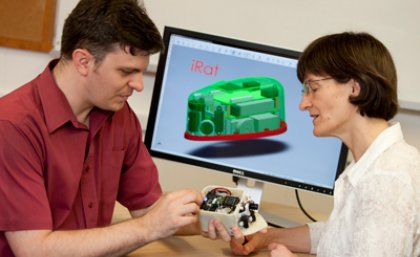
Do you navigate well or lose your way easily and never understand why?
Find out how your brain works on 22 November, when The University of Queensland (UQ) will host the 2010 Thinking Systems Symposium at the Queensland Brain Institute at UQ’s St Lucia campus.
The full-day event will allow the public to hear from leading neuroscientists and engineers in Australia on the amazing abilities of big and small brains, from honeybees to humans, and rats to robots.
Team leader and cognitive scientist from UQ’s School of Information Technology and Electrical Engineering Professor Janet Wiles said that the one-day Symposium at UQ would showcase eight projects across five major research themes.
“The public will get to see the research teams presenting their exciting findings in the development of new technologies, including robots that create their own maps inspired by biology,” Professor Wiles said.
“They will also learn about virtual reality worlds for studying bee flight and human navigation, how rats and robots use place cells to navigate, and how navigation is inspiring new ways to understand complex thinking.”
Supported by the Australian Research Council (ARC)’s Special Research Initiatives funding scheme, $3.3 million was provided to UQ to support the development of fundamental insights into physical and conceptual spaces and to develop applications in robotics and information systems.
“This event showcases the first four years of our research program and provides a great opportunity for the public to learn about the projects that have been developed during this time,” Professor Wiles said.
The Symposium will take place in the Queensland Brain Institute’s (Building No 79) Level 7 auditorium and terrace at UQ’s St Lucia campus on Monday 22 November between 10.30am and 5.30pm.
ARC’s Executive Director for Physical, Mathematical and Information Sciences Professor Richard Coleman will open the Symposium at 11am.
Thinking Systems Themes:
Theme 1: Neural Mechanisms for Navigation (led by Professor Mandyam Srinivasan) This theme investigates the neural mechanisms for navigation in insects via electrophysiology and behavioural observation, researching to help design computationally efficient and reliable algorithms for autonomous navigation.
Theme 2: Spatial maps and neurally inspired algorithms (led by Professor Pankaj Sah)
This theme investigates the neural mechanisms for navigation in freely behaving rodents via electrophysiology and behavioural observation and further investigates the fundamental computational principles involved in generating, updating and using efficient spatial representations, and developing mathematical and computational models inspired by neurophysiological and neurocognitive data from insects, rodents and humans.
Theme 3: Biologically Inspired Robot Navigation (led by Gordon Wyeth)
The robotics plays two roles in this project. Firstly, robots are serving as mechanisms for embodying the neurocomputational models of navigation in real physical spaces, with focus on the biological plausibility of the models. In the second role, the neurocomputational models are serving as inspiration for frontier technologies for sensing and navigation in autonomous robots. The focus in the second role is on engineering effectiveness.
Theme 4: From physical to conceptual spaces (led by Professor Jason Mattingley)
Humans are exquisite navigators, yet little is known about the environmental cues upon which we rely when finding our way in new or otherwise unfamiliar environments. This theme determines the neural and cognitive processes responsible for object location-memory and landmark-based navigation in adult human participants across a series of experiments using functional magnetic resonance imaging to reveal the neural correlates of encoding and retrieval of visual landmarks in novel, virtual arenas. The team also investigates the effects of cerebral stroke on a variety of navigation processes.
Theme 5: Navigating Information Spaces - Automated Conceptual Mapping Systems (led by Dr Andrew Smith)
This theme is using insights from biological navigation systems to develop algorithms for automated concept mapping and the project aims to understand how trajectories through information spaces are used to build maps and how to use maps to achieve goals.
For more information on the 2010 Thinking System Symposium, please visit http://www.thinkingsystems.edu.au/.
Media Enquiries: (Professor Janet Wiles 07 3365 2902 j.wiles@uq.edu.au) or (Izzy Koh at the Faculty of Engineering, Architecture and Information Technology i.koh@uq.edu.au or 07 3346 7696)
.jpg)



